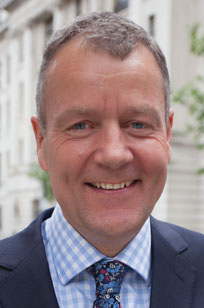Brown excited by strategic opportunity
‘Moving away from the traditional contractual arrangements between commissioning and providing creates a brilliant opportunity for us to work in a completely different way,’ he says.

‘Sometimes CCGs have struggled to have real influence in the system. The strategic commissioner idea excites me – creating something strategic that works at a system level but also helps local decision-making.’
Change happens at clinician-to-clinician level, he adds. But that can get lost within the artificial confines of traditional contracting, which can lead to multiple agreements between commissioners and providers. Contracting through an integrated care system (ICS) ensures more sensible decisions are made and the contractual barriers to change are lifted, he says.
The six Staffordshire CCGs are not yet an ICS, but are building together. ‘Staffordshire has a history of difficult relationships, but last year – 2019/20 – the system created an intelligent fixed payment system,’ Mr Brown explains.
This is similar to the aligned incentives contract used elsewhere in the NHS and has reduced conflict. ‘Rather than having to have regular arbitration and argument, we have an agreed position across the system. The system started to work together and has come out with an agreed ICS position.
‘People have started to see the benefits of us becoming a merged strategic commissioner and alongside that there is a massive planning role for us in the system for the migration to integrated care providers and primary care networks.’
One of his main objectives is to manage the system finances between the partners under the fixed payment system. He also acknowledges that Staffordshire and Stoke-on-Trent still have significant ongoing financial problems, with a £156m underlying deficit overall.
‘The fixed payment system made the first step as it stopped everyone arguing over the deficit or which part of the system should have which bit of the debt. This has enabled relationships to flourish. The second thing, which will be at least as difficult, is fixing the underlying deficit, but we are confident that it can be done.’
Central to that will be the devolvement of decision-making to primary care networks (PCNs) that will be key partners in delivering the improvements on the ground.
‘It’s all about finding the balance between what needs to work at scale and what is devolved down. We are committed to devolution and we are working through it, but it needs to become real, delegated authority to people at local level.’
But devolution cannot end up with 25 PCNs doing their own thing, reinventing the wheel each time, he says. The CCGs want to tackle unwarranted variation, but he feels sometimes the NHS faces data overload.
‘Sometimes you can’t see the wood for the trees, but with the PCN population at around 50,000, you have enough to look at variation but it’s small enough to get the practices around the table.’
After training as an accountant on the NHS training scheme, Mr Brown spent his first 17 years after university working for the NHS in London, Kent and Sussex. Ten were as finance director in three provider trusts, spanning acute, community and mental health.
A further 16 were spent as a management consultant, working in health, but also education, local government, central government, housing and nuclear power.
He returned to the NHS in 2018 as chief finance officer for eight CCGs in North West London, before joining the six Staffordshire and Stoke-on-Trent CCGs in June.
On the challenges of joining a new organisation during the pandemic, with many staff working from home, Mr Brown says: ‘It has been strange, but it has worked.
‘I started during the lockdown and the CCGs were working 100% remotely. Given that, it has worked incredibly well.
'We’ve used Microsoft Teams and I feel I’ve got to meet everyone in the system. It might be strange when we meet for the first time in person. I’ve made a few changes to the finance team and all have responded well. I can’t think of anything I’ve done [in lockdown] that I wouldn’t have done anyway.’
Related content
The value masterclass shares examples of organisations and systems that have pursued a value-driven approach and the results they have achieved.
This webinar series offers colleagues of ICS organisations the opportunity to discuss common priorities, challenges, and successes within their field.